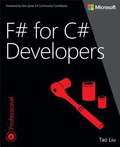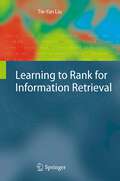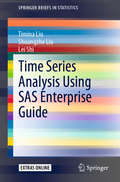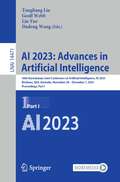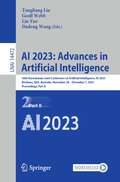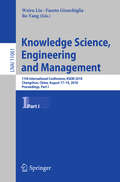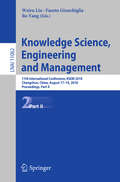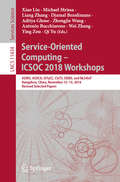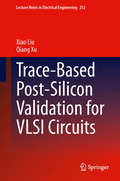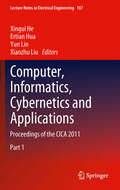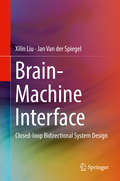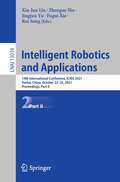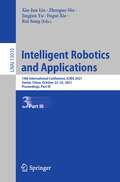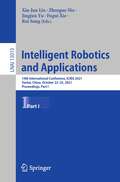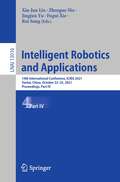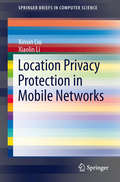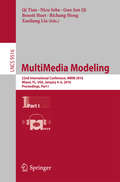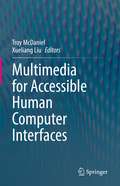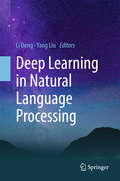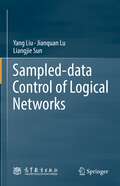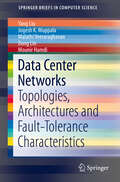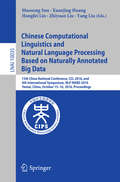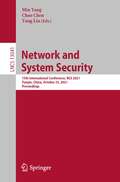- Table View
- List View
F# for C# Developers
by Tao LiuExtend your C# skills to F#--and create data-rich computational and parallel software components faster and more efficiently. Focusing on F# 3.0 and Microsoft Visual Studio 2012, you'll learn how to exploit F# features to solve both computationally-complex problems as well as everyday programming tasks. Topics include: C# and F# data structures; F# for functional, object-oriented, and imperative programming; design patterns; type providers; and portable support for Windows 8. You'll examine real-world applications, including Windows 8-style HTML5 and JavaScript apps, along with cloud and service apps. You'll write your own type provider. And you'll see how to expand F# computation power to high-performance GPU computing.
Learning to Rank for Information Retrieval
by Tie-Yan LiuDue to the fast growth of the Web and the difficulties in finding desired information, efficient and effective information retrieval systems have become more important than ever, and the search engine has become an essential tool for many people. The ranker, a central component in every search engine, is responsible for the matching between processed queries and indexed documents. Because of its central role, great attention has been paid to the research and development of ranking technologies. In addition, ranking is also pivotal for many other information retrieval applications, such as collaborative filtering, definition ranking, question answering, multimedia retrieval, text summarization, and online advertisement. Leveraging machine learning technologies in the ranking process has led to innovative and more effective ranking models, and eventually to a completely new research area called "learning to rank". Liu first gives a comprehensive review of the major approaches to learning to rank. For each approach he presents the basic framework, with example algorithms, and he discusses its advantages and disadvantages. He continues with some recent advances in learning to rank that cannot be simply categorized into the three major approaches - these include relational ranking, query-dependent ranking, transfer ranking, and semisupervised ranking. His presentation is completed by several examples that apply these technologies to solve real information retrieval problems, and by theoretical discussions on guarantees for ranking performance. This book is written for researchers and graduate students in both information retrieval and machine learning. They will find here the only comprehensive description of the state of the art in a field that has driven the recent advances in search engine development.
Time Series Analysis Using SAS Enterprise Guide (SpringerBriefs in Statistics)
by Timina Liu Shuangzhe Liu Lei ShiThis is the first book to present time series analysis using the SAS Enterprise Guide software. It includes some starting background and theory to various time series analysis techniques, and demonstrates the data analysis process and the final results via step-by-step extensive illustrations of the SAS Enterprise Guide software. This book is a practical guide to time series analyses in SAS Enterprise Guide, and is valuable resource that benefits a wide variety of sectors.
AI 2023: 36th Australasian Joint Conference on Artificial Intelligence, AI 2023, Brisbane, QLD, Australia, November 28–December 1, 2023, Proceedings, Part I (Lecture Notes in Computer Science #14471)
by Tongliang Liu Geoff Webb Lin Yue Dadong WangThis two-volume set LNAI 14471-14472 constitutes the refereed proceedings of the 36th Australasian Joint Conference on Artificial Intelligence, AI 2023, held in Brisbane, QLD, Australia during November 28 – December 1, 2023. The 23 full papers presented together with 59 short papers were carefully reviewed and selected from 213 submissions. They are organized in the following topics: computer vision; deep learning; machine learning and data mining; optimization; medical AI; knowledge representation and NLP; explainable AI; reinforcement learning; and genetic algorithm.
AI 2023: 36th Australasian Joint Conference on Artificial Intelligence, AI 2023, Brisbane, QLD, Australia, November 28–December 1, 2023, Proceedings, Part II (Lecture Notes in Computer Science #14472)
by Tongliang Liu Geoff Webb Lin Yue Dadong WangThis two-volume set LNAI 14471-14472 constitutes the refereed proceedings of the 36th Australasian Joint Conference on Artificial Intelligence, AI 2023, held in Brisbane, QLD, Australia during November 28 – December 1, 2023. The 23 full papers presented together with 59 short papers were carefully reviewed and selected from 213 submissions. They are organized in the following topics: computer vision; deep learning; machine learning and data mining; optimization; medical AI; knowledge representation and NLP; explainable AI; reinforcement learning; and genetic algorithm..
Knowledge Science, Engineering and Management: 11th International Conference, KSEM 2018, Changchun, China, August 17–19, 2018, Proceedings, Part I (Lecture Notes in Computer Science #11061)
by Weiru Liu Fausto Giunchiglia Bo YangThis two volume set of LNAI 11061 and LNAI 11062 constitutes the refereed proceedings of the 11th International Conference on Knowledge Science, Engineering and Management, KSEM 2018, held in Changchun, China, in August 2018. The 62 revised full papers and 26 short papers presented were carefully reviewed and selected from 262 submissions. The papers of the first volume are organized in the following topical sections: text mining and document analysis; image and video data analysis; data processing and data mining; recommendation algorithms and systems; probabilistic models and applications; knowledge engineering applications; and knowledge graph and knowledge management. The papers of the second volume are organized in the following topical sections: constraints and satisfiability; formal reasoning and ontologies; deep learning; network knowledge representation and learning; and social knowledge analysis and management.
Knowledge Science, Engineering and Management: 11th International Conference, KSEM 2018, Changchun, China, August 17–19, 2018, Proceedings, Part II (Lecture Notes in Computer Science #11062)
by Weiru Liu Fausto Giunchiglia Bo YangThis two volume set of LNAI 11061 and LNAI 11062 constitutes the refereed proceedings of the 11th International Conference on Knowledge Science, Engineering and Management, KSEM 2018, held in Changchun, China, in August 2018. The 62 revised full papers and 26 short papers presented were carefully reviewed and selected from 262 submissions. The papers of the first volume are organized in the following topical sections: text mining and document analysis; image and video data analysis; data processing and data mining; recommendation algorithms and systems; probabilistic models and applications; knowledge engineering applications; and knowledge graph and knowledge management. The papers of the second volume are organized in the following topical sections: constraints and satisfiability; formal reasoning and ontologies; deep learning; network knowledge representation and learning; and social knowledge analysis and management.
Service-Oriented Computing – ICSOC 2018 Workshops: ADMS, ASOCA, ISYyCC, CloTS, DDBS, and NLS4IoT, Hangzhou, China, November 12–15, 2018, Revised Selected Papers (Lecture Notes in Computer Science #11434)
by Xiao Liu Michael Mrissa Liang Zhang Djamal Benslimane Aditya Ghose Zhongjie Wang Antonio Bucchiarone Wei Zhang Ying Zou Qi YuThis book constitutes the revised selected papers of the scientific satellite events that were held in conjunction with the 16th International Conference on Service-Oriented Computing, ICSOC 2018, held in Hangzhou, China, in November 2018.The ICSOC 2018 workshop track consisted of six workshops on a wide range of topics that fall into the general area of service computing. A special focus this year was on Internet of Things, Data Analytics, and Smart Services: First International Workshop on Data-Driven Business Services (DDBS)First International Workshop on Networked Learning Systems for Secured IoT Services and Its Applications (NLS4IoT)8th International Workshop on Context-Aware and IoT Services (CIoTS)Third International Workshop on Adaptive Service-oriented and Cloud Applications (ASOCA2018)Third International Workshop on IoT Systems for Context-aware Computing (ISyCC)First International Workshop on AI and Data Mining for Services (ADMS)
Trace-Based Post-Silicon Validation for VLSI Circuits
by Xiao Liu Qiang XuThis book first provides a comprehensive coverage of state-of-the-art validation solutions based on real-time signal tracing to guarantee the correctness of VLSI circuits. The authors discuss several key challenges in post-silicon validation and provide automated solutions that are systematic and cost-effective. A series of automatic tracing solutions and innovative design for debug (DfD) techniques are described, including techniques for trace signal selection for enhancing visibility of functional errors, a multiplexed signal tracing strategy for improving functional error detection, a tracing solution for debugging electrical errors, an interconnection fabric for increasing data bandwidth and supporting multi-core debug, an interconnection fabric design and optimization technique to increase transfer flexibility and a DfD design and associated tracing solution for improving debug efficiency and expanding tracing window. The solutions presented in this book improve the validation quality of VLSI circuits, and ultimately enable the design and fabrication of reliable electronic devices.
Computer, Informatics, Cybernetics and Applications: Proceedings of the CICA 2011 (Lecture Notes in Electrical Engineering #107)
by Xiaozhu Liu Ertian Hua Xingui He Yun LinThe Conference on Computer, Informatics, Cybernetics and Applications 2011 aims to facilitate an exchange of information on best practices for the latest research advances in the area of computer, informatics, cybernetics and applications, which mainly includes computer science and engineering, informatics, cybernetics, control systems, communication and network systems, technologies and applications, others and emerging new topics.
Proceedings of the 9th International Symposium on Linear Drives for Industry Applications, Volume 1
by Xiaozhu Liu Yunyue YeThe 9th International Symposium on Linear Drives for Industry Applications (LDIA 2013) was held on July 7-10, 2013 in Hangzhou, China. The LDIA 2013 was organized by Zhejiang University, a leading comprehensive university in China, and offered a venue for leading academic and industrial researchers to exchange their views, ideas and findings on innovative technologies and sustainable solutions leading to linear drivers and intelligence applications. The conference featured keynote speakers, a panel discussion and paper presentations. The objective of the LDIA 2013 is to facilitate the exchange of information on best practices and to profile the latest research advances in the areas of linear drive technologies, control theory, information engineering, control engineering and intelligence applications, which mainly concern the fields of Engineering and Computer Science, Informatics, Communications and Control etc. The proceedings are intended for scientists, engineers and graduate students in Engineering and Computer Science, especially those focusing on linear drives.
Proceedings of the 9th International Symposium on Linear Drives for Industry Applications, Volume 4
by Xiaozhu Liu Yunyue YeThe 9th International Symposium on Linear Drives for Industry Applications (LDIA 2013) was held on July 7-10, 2013 in Hangzhou, China. The LDIA 2013 was organized by Zhejiang University, a leading comprehensive university in China, and offered a venue for leading academic and industrial researchers to exchange their views, ideas and findings on innovative technologies and sustainable solutions leading to linear drivers and intelligence applications. The conference featured keynote speakers, a panel discussion and paper presentations. The objective of the LDIA 2013 is to facilitate the exchange of information on best practices and to profile the latest research advances in the areas of linear drive technologies, control theory, information engineering, control engineering and intelligence applications, which mainly concern the fields of Engineering and Computer Science, Informatics, Communications and Control etc. The proceedings are intended for scientists, engineers and graduate students in Engineering and Computer Science, especially those focusing on linear drives.
Brain-Machine Interface: Closed-loop Bidirectional System Design
by Xilin Liu Jan Van der SpiegelThis book provides an introduction to the emerging area of "Brain-Machine Interfaces," with emphasis on the operation and practical design aspects. The book will help both electrical & bioengineers as well as neuroscience investigators to learn about the next generation brain-machine interfaces. The comprehensive review and design analysis will be very helpful for researchers who are new to this area or interested in the study of the brain. The in-depth discussion of practical design issues especially in animal experiments will also be valuable for experienced researchers.
Intelligent Robotics and Applications: 14th International Conference, ICIRA 2021, Yantai, China, October 22–25, 2021, Proceedings, Part II (Lecture Notes in Computer Science #13014)
by Xin-Jun Liu Zhenguo Nie Jingjun Yu Fugui Xie Rui SongThe 4-volume set LNAI 13013 – 13016 constitutes the proceedings of the 14th International Conference on Intelligent Robotics and Applications, ICIRA 2021, which took place in Yantai, China, during October 22-25, 2021.The 299 papers included in these proceedings were carefully reviewed and selected from 386 submissions. They were organized in topical sections as follows: Robotics dexterous manipulation; sensors, actuators, and controllers for soft and hybrid robots; cable-driven parallel robot; human-centered wearable robotics; hybrid system modeling and human-machine interface; robot manipulation skills learning; micro_nano materials, devices, and systems for biomedical applications; actuating, sensing, control, and instrumentation for ultra-precision engineering; human-robot collaboration; robotic machining; medical robot; machine intelligence for human motion analytics; human-robot interaction for service robots; novel mechanisms, robots and applications; space robot and on-orbit service; neural learning enhanced motion planning and control for human robot interaction; medical engineering.
Intelligent Robotics and Applications: 14th International Conference, ICIRA 2021, Yantai, China, October 22–25, 2021, Proceedings, Part III (Lecture Notes in Computer Science #13015)
by Xin-Jun Liu Zhenguo Nie Jingjun Yu Fugui Xie Rui SongThe 4-volume set LNAI 13013 – 13016 constitutes the proceedings of the 14th International Conference on Intelligent Robotics and Applications, ICIRA 2021, which took place in Yantai, China, during October 22-25, 2021.The 299 papers included in these proceedings were carefully reviewed and selected from 386 submissions. They were organized in topical sections as follows: Robotics dexterous manipulation; sensors, actuators, and controllers for soft and hybrid robots; cable-driven parallel robot; human-centered wearable robotics; hybrid system modeling and human-machine interface; robot manipulation skills learning; micro_nano materials, devices, and systems for biomedical applications; actuating, sensing, control, and instrumentation for ultra-precision engineering; human-robot collaboration; robotic machining; medical robot; machine intelligence for human motion analytics; human-robot interaction for service robots; novel mechanisms, robots and applications; space robot and on-orbit service; neural learning enhanced motion planning and control for human robot interaction; medical engineering.
Intelligent Robotics and Applications: 14th International Conference, ICIRA 2021, Yantai, China, October 22–25, 2021, Proceedings, Part I (Lecture Notes in Computer Science #13013)
by Xin-Jun Liu Zhenguo Nie Jingjun Yu Fugui Xie Rui SongThe 4-volume set LNAI 13013 – 13016 constitutes the proceedings of the 14th International Conference on Intelligent Robotics and Applications, ICIRA 2021, which took place in Yantai, China, during October 22-25, 2021.The 299 papers included in these proceedings were carefully reviewed and selected from 386 submissions. They were organized in topical sections as follows: Robotics dexterous manipulation; sensors, actuators, and controllers for soft and hybrid robots; cable-driven parallel robot; human-centered wearable robotics; hybrid system modeling and human-machine interface; robot manipulation skills learning; micro_nano materials, devices, and systems for biomedical applications; actuating, sensing, control, and instrumentation for ultra-precision engineering; human-robot collaboration; robotic machining; medical robot; machine intelligence for human motion analytics; human-robot interaction for service robots; novel mechanisms, robots and applications; space robot and on-orbit service; neural learning enhanced motion planning and control for human robot interaction; medical engineering.
Intelligent Robotics and Applications: 14th International Conference, ICIRA 2021, Yantai, China, October 22–25, 2021, Proceedings, Part IV (Lecture Notes in Computer Science #13016)
by Xin-Jun Liu Zhenguo Nie Jingjun Yu Fugui Xie Rui SongThe 4-volume set LNAI 13013 – 13016 constitutes the proceedings of the 14th International Conference on Intelligent Robotics and Applications, ICIRA 2021, which took place in Yantai, China, during October 22-25, 2021.The 299 papers included in these proceedings were carefully reviewed and selected from 386 submissions. They were organized in topical sections as follows: Robotics dexterous manipulation; sensors, actuators, and controllers for soft and hybrid robots; cable-driven parallel robot; human-centered wearable robotics; hybrid system modeling and human-machine interface; robot manipulation skills learning; micro_nano materials, devices, and systems for biomedical applications; actuating, sensing, control, and instrumentation for ultra-precision engineering; human-robot collaboration; robotic machining; medical robot; machine intelligence for human motion analytics; human-robot interaction for service robots; novel mechanisms, robots and applications; space robot and on-orbit service; neural learning enhanced motion planning and control for human robot interaction; medical engineering.
Location Privacy Protection in Mobile Networks
by Xinxin Liu Xiaolin LiThis SpringerBrief analyzes the potential privacy threats in wireless and mobile network environments, and reviews some existing works. It proposes multiple privacy preserving techniques against several types of privacy threats that are targeting users in a mobile network environment. Depending on the network architecture, different approaches can be adopted. The first proposed approach considers a three-party system architecture where there is a trusted central authority that can be used to protect users' privacy. The second approach considers a totally distributed environment where users perform privacy protection by themselves. Finally, more general system architecture is discussed including how a semi-trusted server may exist, but users need to collaborate to achieve maximized privacy protection. This brief is designed for researchers and professionals working with privacy preservation, mobile networks, and threat models. The variety of approaches presented makes it useful for students as well.
MultiMedia Modeling
by Xueliang Liu Richang Hong Benoit Huet Guo-Jun Qi Nicu Sebe Qi TianThe two-volume set LNCS 9516 and 9517 constitutes the thoroughly refereed proceedings of the 22nd International Conference on Multimedia Modeling, MMM 2016, held in Miami, FL, USA, in January 2016. The 32 revised full papers and 52 poster papers were carefully reviewed and selected from 117 submissions. In addition 20 papers were accepted for five special sessions out of 38 submissions as well as 7 demonstrations (from 11 submissions) and 9 video showcase papers. The papers are organized in topical sections on video content analysis, social media analysis, object recognition and system, multimedia retrieval and ranking, multimedia representation, machine learning in multimedia, and interaction and mobile. The special sessions are: good practices in multimedia modeling; semantics discovery from multimedia big data; perception, aesthetics, and emotion in multimedia quality modeling; multimodal learning and computing for human activity understanding; and perspectives on multimedia analytics.
Multimedia for Accessible Human Computer Interfaces
by Xueliang Liu Troy McDanielThe book Multimedia for Accessible Human Computer Interfaces is to be the first resource to provide in-depth coverage on topical areas of multimedia computing (images, video, audio, speech, haptics, VR/AR, etc.) for accessible and inclusive human computer interfaces. Topics are grouped into thematic areas spanning the human senses: Vision, Hearing, Touch, as well as Multimodal applications. Each chapter is written by different multimedia researchers to provide complementary and multidisciplinary perspectives. Unlike other related books, which focus on guidelines for designing accessible interfaces, or are dated in their coverage of cutting edge multimedia technologies, Multimedia for Accessible Human Computer Interfaces takes an application-oriented approach to present a tour of how the field of multimedia is advancing access to human computer interfaces for individuals with disabilities.Under Theme 1 “Vision-based Technologies for Accessible Human Computer Interfaces”, multimedia technologies to enhance access to interfaces through vision will be presented including: “A Framework for Gaze-contingent Interfaces”, “Sign Language Recognition”, “Fusion-based Image Enhancement and its Applications in Mobile Devices”, and “Open-domain Textual Question Answering Systems”. Under Theme 2 “Auditory Technologies for Accessible Human Computer Interfaces”, multimedia technologies to enhance access to interfaces through hearing will be presented including: “Speech Recognition for Individuals with Voice Disorders” and “Socially Assistive Robots for Storytelling and Other Activities to Support Aging in Place”. Under Theme 3 “Haptic Technologies for Accessible Human Computer Interfaces”, multimedia technologies to enhance access to interfaces through haptics will be presented including: “Accessible Smart Coaching Technologies Inspired by Elderly Requisites” and “Haptic Mediators for Remote Interpersonal Communication”. Under Theme 4 “Multimodal Technologies for Accessible Human Computer Interfaces”, multimedia technologies to enhance access to interfaces through multiple modalities will be presented including: “Human-Machine Interfaces for Socially Connected Devices: From Smart Households to Smart Cities” and “Enhancing Situational Awareness and Kinesthetic Assistance for Clinicians via Augmented-Reality and Haptic Shared-Control Technologies”.
Deep Learning in Natural Language Processing
by Yang Liu Li DengIn recent years, deep learning has fundamentally changed the landscapes of a number of areas in artificial intelligence, including speech, vision, natural language, robotics, and game playing. In particular, the striking success of deep learning in a wide variety of natural language processing (NLP) applications has served as a benchmark for the advances in one of the most important tasks in artificial intelligence. This book reviews the state of the art of deep learning research and its successful applications to major NLP tasks, including speech recognition and understanding, dialogue systems, lexical analysis, parsing, knowledge graphs, machine translation, question answering, sentiment analysis, social computing, and natural language generation from images. Outlining and analyzing various research frontiers of NLP in the deep learning era, it features self-contained, comprehensive chapters written by leading researchers in the field. A glossary of technical terms and commonly used acronyms in the intersection of deep learning and NLP is also provided. The book appeals to advanced undergraduate and graduate students, post-doctoral researchers, lecturers and industrial researchers, as well as anyone interested in deep learning and natural language processing.
Sampled-data Control of Logical Networks
by Yang Liu Jianquan Lu Liangjie SunThis book mainly focuses on the sampled-data control of logical networks. We believe that the methods (semi-tensor product of matrices), results (recent results on Boolean control networks under periodic sampled-data control, Boolean control networks under aperiodic sampled-data control, and logical control networks under event-triggered control) and topics (logical networks) in this book have become of particular interest to readers recently. Firstly, logical networks are of interest due to their rich range of applications in biology, game theory, coding, finite automata, graph theory, and other fields. Secondly, semi-tensor product of matrices offers a useful tool for formulating, analyzing and designing controllers for logical networks. Moreover, this book is the first to introduce sampled-data control into the study of logical control networks. All research results in this book are novel and worthy of further study. The book’s content is divided into three parts (Boolean control networks under periodic sampled-data control, Boolean control networks under aperiodic sampled-data control, and logical control networks under event-triggered control), which essentially progress from easier to more difficult. In addition, corresponding examples and diagrams are included in each section to facilitate understanding.
Data Center Networks: Topologies, Architectures and Fault-Tolerance Characteristics (SpringerBriefs in Computer Science)
by Yang Liu Jogesh K. Muppala Malathi Veeraraghavan Dong Lin Mounir HamdiThis SpringerBrief presents a survey of data center network designs and topologies and compares several properties in order to highlight their advantages and disadvantages. The brief also explores several routing protocols designed for these topologies and compares the basic algorithms to establish connections, the techniques used to gain better performance, and the mechanisms for fault-tolerance. Readers will be equipped to understand how current research on data center networks enables the design of future architectures that can improve performance and dependability of data centers. This concise brief is designed for researchers and practitioners working on data center networks, comparative topologies, fault tolerance routing, and data center management systems. The context provided and information on future directions will also prove valuable for students interested in these topics.
Chinese Computational Linguistics and Natural Language Processing Based on Naturally Annotated Big Data: 15th China National Conference, CCL 2016, and 4th International Symposium, NLP-NABD 2016, Yantai, China, October 15-16, 2016, Proceedings (Lecture Notes in Computer Science #10035)
by Yang Liu Maosong Sun Zhiyuan Liu Xuanjing Huang Hongfei LinThis book constitutes the proceedings of the 15th China National Conference on Computational Linguistics, CCL 2016, and the 4th International Symposium on Natural Language Processing Based on Naturally Annotated Big Data, NLP-NABD 2016, held in Yantai City, China, in October 2016. The 29 full papers and 8 short papers presented in this volume were carefully reviewed and selected from 85 submissions. They were organized in topical sections named: semantics; machine translation; multilinguality in NLP; knowledge graph and information extraction; linguistic resource annotation and evaluation; information retrieval and question answering; text classification and summarization; social computing and sentiment analysis; and NLP applications.
Network and System Security: 15th International Conference, NSS 2021, Tianjin, China, October 23, 2021, Proceedings (Lecture Notes in Computer Science #13041)
by Yang Liu Min Yang Chao ChenThis book constitutes the refereed proceedings of the 15th International Conference on Network and System Security, NSS 2021, held in Tianjin, China, on October 23, 2021. The 16 full and 8 short papers presented in this book were carefully reviewed and selected from 62 submissions. They focus on theoretical and practical aspects of network and system security, such as authentication, access control, availability, integrity, privacy, confidentiality, dependability and sustainability of computer networks and systems.
